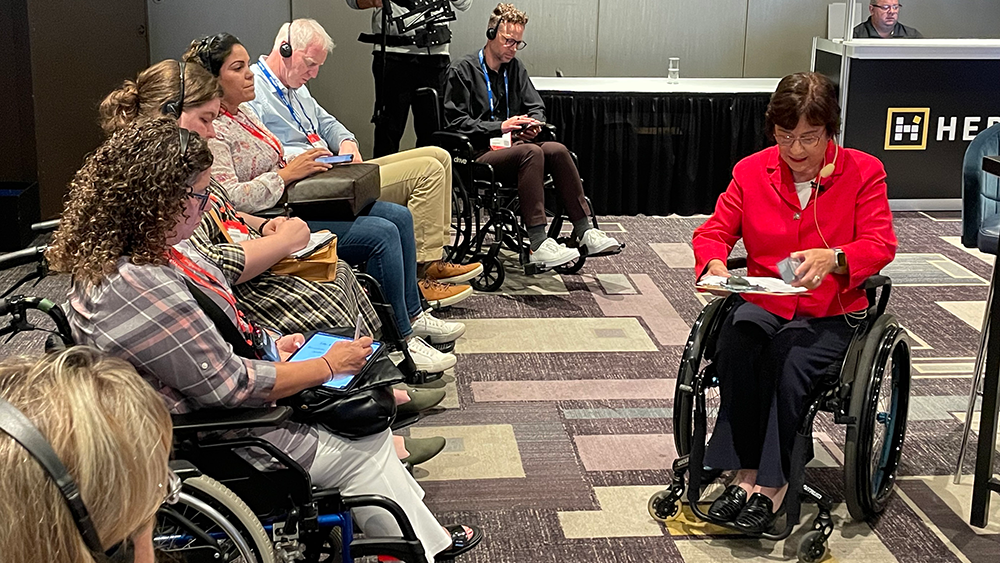
Accessibility advocate Rosemarie Rossetti, Ph.D., leads one of two wheelchair tours through the PCMA EduCon venue earlier this year in Montreal. (Maggie Simkin/PCMA)

Michelle Russell
Editor in Chief
Things can work out really well in my head. (I also have a tendency to awfulize, but that’s another story.) I latch onto an idea and make all the pieces fit neatly into place.
We all do that, especially event designers. It’s what makes us creative human beings: We imagine what does not yet exist in real life and build a story around it. As we marvel at all that generative AI tools like ChatGPT can do — the July/August issue’s cover story and CMP Series topic — I think that’s what separates us. Generative AI is iterative, recombining what already exists to generate new concepts, which is how some event professionals we spoke to are leveraging the tool today. But AI lacks our capacity to imagine.
Our instinct is to follow our imagination where it takes us, but we have to be willing to let go when reality tells us otherwise. We also have to accept that well-intentioned ideas aren’t always universally accepted when we put them out in the world. Or at least those are two lessons I learned by working on our July/August issue.
I’ll start with something urbanist Greg Clark said in a video on The Iceberg about an IMEX session this year: Destinations are seeking to host business events that speak to a challenge they face, like homelessness, as a way to help solve for it. It struck me as the opposite of the knowledge economy approach, where a destination markets its assets — like aligning a state-of-the-art medical center with a medical conference — not its needs. The European SocieTy for Radiotherapy and Oncology (ESTRO) offered a perfect example of that, sharing its site-selection approach, also in The Iceberg, that favors a destination that will commit to an engagement project in its community that will further the association’s mission of treating cancer through radiotherapy.
The successful legacy initiatives in Madrid at ESTRO’s 2021 conference profiled in The Iceberg meshed with the story in my head. Surely that pioneering legacy-first strategy is paving the way for others to demonstrate an event’s “social good” potential. But no, ESTRO CEO Alessandro Cortese said after I sent him my article right before we went to press: It has been suspended in the post-pandemic environment. I had to rewrite my and-then-they-lived-happily-ever-after story.
My second note to self comes from a story we published online about my experience participating in an EduCon session where a small group of event professionals navigated our Montréal hotel in a wheelchair tour led by accessibility advocate Rosemarie Rossetti. It was an interactive experience that had greater impact than reading an article or hearing a presentation on accessibility — for me. But a group of disability advocates have objected to a “pretend” wheelchair exercise as oversimplifying what being disabled is like.
Humans are fallible. Just like the results ChatGPT spits out to our prompts, our ideas need to be checked and verified. As we come to rely more on artificial intelligence in our everyday lives, we’ll also need to tap more often into our emotional intelligence, like listening to others with empathy.
One for the Ages
With more generations than ever together in the workplace, events can be places that not only meet the needs of everyone from Boomers to Gen Xers, but where they have dedicated opportunities to learn from each other. Digital Editor Curt Wagner’s Innovative Meetings story spotlights a collaborative intergenerational session that has become part of the program at the Annual Meeting of the Association for European Paediatric and Congenital Cardiology. Have a look — you’ll also find practical ways to help engage your own early-career members.
Michelle Russell is editor in chief of Convene.
